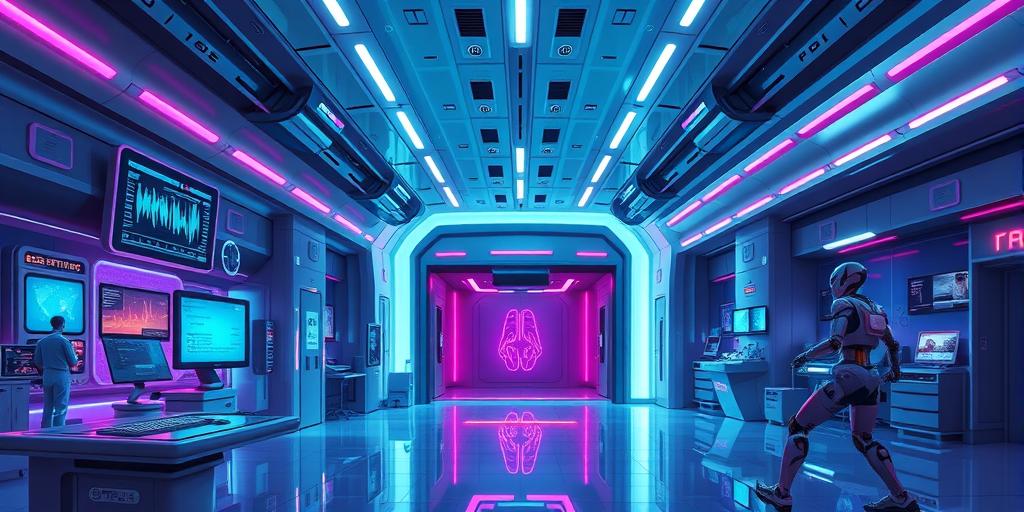Prepare to be amazed! Artificial intelligence (AI) is no longer a futuristic fantasy; it’s rapidly revolutionizing healthcare as we know it, bringing about groundbreaking changes that are transforming patient care, diagnostics, and treatment strategies. From streamlining administrative tasks to developing life-saving medications, AI’s impact is undeniable. But how exactly is this happening? Let’s delve into the fascinating world of AI in healthcare and discover its transformative power.
AI-Powered Diagnostics: A New Era of Accuracy
One of the most significant contributions of AI in healthcare lies in its ability to enhance diagnostic accuracy. Traditional diagnostic methods, while effective, can be time-consuming and prone to human error. AI algorithms, trained on massive datasets of medical images and patient records, can analyze complex medical data with unprecedented speed and accuracy. This leads to faster and more precise diagnoses, allowing for quicker interventions and improved patient outcomes. Think about the potential for early detection of life-threatening conditions like cancer – AI is making this a reality.
AI in Medical Imaging:
AI-powered image analysis is transforming radiology, pathology, and other imaging-dependent specialties. Algorithms can detect subtle anomalies in medical images (X-rays, CT scans, MRIs) that might be missed by the human eye, improving the detection of cancers, cardiovascular diseases, and neurological disorders. This increased accuracy translates to earlier diagnosis and treatment, significantly improving patient survival rates and quality of life. The applications are truly groundbreaking, leading to a future where diseases are detected far sooner than ever before.
AI-Driven Predictive Analytics:
AI’s predictive capabilities are changing the game in healthcare. By analyzing vast amounts of patient data, AI algorithms can identify individuals at high risk of developing specific diseases. This allows healthcare providers to implement proactive measures, such as lifestyle changes or preventative screenings, significantly reducing the likelihood of disease onset. This preventative approach is a paradigm shift in healthcare, moving from reactive to proactive care.
Streamlining Healthcare Operations: Efficiency and Cost Savings
Beyond diagnostics, AI is revolutionizing the administrative and operational aspects of healthcare. From scheduling appointments to managing medical records, AI-powered tools are streamlining processes and improving efficiency. This increased efficiency leads to significant cost savings for healthcare systems and improved patient experiences. The impact on everyday operations is profound.
AI in Administrative Tasks:
AI-powered chatbots and virtual assistants are now handling routine tasks such as appointment scheduling, answering patient queries, and managing medical records. This frees up healthcare professionals to focus on patient care, leading to increased productivity and improved patient satisfaction. The automation of these tasks allows for a better patient experience with more personal interaction with their healthcare provider.
AI-Driven Drug Discovery and Development:
The pharmaceutical industry is also benefiting significantly from AI. AI algorithms can analyze massive datasets of molecular structures and biological information to identify potential drug candidates, accelerating the drug discovery process. This leads to the development of new medications and treatments for various diseases, saving time and resources, and ultimately benefitting patients worldwide. Imagine how AI can help treat rare diseases and improve treatment plans for common conditions like diabetes and heart disease.
Personalized Medicine: Tailoring Treatment to the Individual
One of the most exciting aspects of AI in healthcare is its potential for personalized medicine. AI algorithms can analyze an individual’s unique genetic makeup, lifestyle, and medical history to tailor treatment plans specifically to their needs. This approach moves away from a one-size-fits-all model of healthcare and leads to more effective and personalized treatments. Personalized medicine is shaping the future of healthcare, with AI leading the way in developing bespoke treatment plans.
AI-Driven Treatment Optimization:
AI is also improving the effectiveness of existing treatments. By analyzing patient response data, AI algorithms can optimize treatment plans in real-time, ensuring patients receive the most effective care possible. This adaptive approach is significantly improving patient outcomes and optimizing the use of resources.
AI and Telemedicine:
The rise of telemedicine has been further enhanced by AI. AI-powered platforms are improving remote patient monitoring, facilitating virtual consultations, and providing diagnostic support to healthcare professionals in remote areas. This is particularly beneficial for patients in underserved areas who may have limited access to healthcare.
The Future of AI in Healthcare: Unforeseen Possibilities
The integration of AI into healthcare is still in its early stages, yet its potential is already transforming the landscape of medical care. As AI technology continues to advance, we can expect even more innovative applications in the coming years. The future holds endless possibilities, and AI will continue to play a vital role in shaping the health of future generations. The continued development and implementation of AI in healthcare will lead to a more efficient, effective, and patient-centric healthcare system.
Ready to embrace the future of healthcare? Start exploring the possibilities of AI in your practice or organization today!




